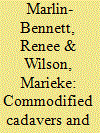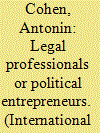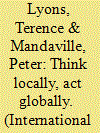| Srl | Item |
| 1 |
ID:
096555


|
|
|
| 2 |
ID:
096552


|
|
|
|
|
| Publication |
2010.
|
| Summary/Abstract |
Traveling anatomy exhibitions import plasticized, posed human cadavers and place them on display. We explore the current industry, its history, and the spectacle of anatomy exhibits. The commodification of cadavers is examined as a problem in global political economy. The absence of global rules identifying plastinated cadavers as human remains allows a globalized plastination and exhibition industry. The spectacle of the exhibitions themselves divert attention away from important moral questions about the proper use of human remains and about the provenance of the cadavers used to create plastinates. The absence of global norms and the distraction of spectacle results in a global regime permitting commodification of cadavers.
|
|
|
|
|
|
|
|
|
|
|
|
|
|
|
|
| 3 |
ID:
096546


|
|
|
| 4 |
ID:
096548


|
|
|
|
|
| Publication |
2010.
|
| Summary/Abstract |
Political dynamics and outcomes around the globe have been transformed by globalization, new patterns of human mobility, and the development of innovative transnational social networks. These new political processes are rooted in communities and networks that are not restricted by geographic location. Although politics has been delinked from territory in this way with regard to processes and actors, this does not mean that transnational politics focuses exclusively on universal issues or global approaches to social justice. Rather much of the new transnational politics is intensely focused on specific locations, identities, and issues (for example, "globalized" neighborhood associations, ethnicities, patrimonialism). Transnational politics also includes new conceptions and practices of citizenship and accountability (for example, legislative seats reserved for expatriate labor migrants) as the body politic becomes increasing mobile, political affinities delinked from geographic proximity, and critical constituencies reside outside of the territory of the state. This article outlines a new approach to investigating the actors and processes at the heart of contemporary transnational politics, with a particular focus on the ways in which diasporas are strategically constructed and mobilized to advance political goals through the use of salient symbols, identity frames, and social networks.
|
|
|
|
|
|
|
|
|
|
|
|
|
|
|
|
| 5 |
ID:
096550


|
|
|
|
|
| Publication |
2010.
|
| Summary/Abstract |
This article is a contribution to the sociological and anthropological literature on the recent globalization of Western biomedical research ethics and bioethics. Focusing on Singapore, the article identifies and traces the genealogy of the concepts, expertise, and techniques that made it possible to introduce and develop a bioethical assemblage in the Southeast Asian city-state at the turn of the twenty-first century. It argues that what made such a development possible was a particular style of reasoning, the "will to modernize," which has characterized the thinking and acting of the Singaporean leadership ever since the country's independence. After describing the elements that make up the will to modernize, most notably the concept of modernization-as-economic-development and the notion of infrastructure, the article shows how these elements have allowed for Singapore's efforts to transform the island into a global hub for the life sciences from the mid-1980s onward. The article also shows how the development of a bioethical assemblage in the Republic was made possible by the fact that, for the governing elite, such an assemblage was conceived as a "(soft) infrastructure" that was necessary to transform Singapore into a global hub for biomedical research.
|
|
|
|
|
|
|
|
|
|
|
|
|
|
|
|
| 6 |
ID:
096554


|
|
|
|
|
| Publication |
2010.
|
| Summary/Abstract |
Buffy the Vampire Slayer presents an argument about and critique of work that signals work's transformation from an alienating burden imposed upon the worker into the prospect for autonomy and self-creation through the struggle to integrate creativity with sociability. This transformation of work is realized through a transformation of space that, in turn, signals a connection between the critique of work and the critique of International Relations (IR). To begin to think of a possible world politics that can overcome the limiting of politics in IR may indeed require the kind of critique of work that Buffy the Vampire Slayer develops?a critique that much critical theory seems to have abandoned. Thus a critique of IR entails an analytical engagement with documents that can mediate between theoretical reflection and the lived dramas of everyday life, such as those mediations produced in popular culture.
|
|
|
|
|
|
|
|
|
|
|
|
|
|
|
|